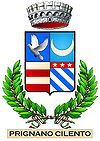Prignano Cilento
| Prignano Cilento | ||
|---|---|---|
| Comune | ||
| Comune di Prignano Cilento | ||

Church of Prignano
|
||
|
||
 Prignano Cilento within the Province of Salerno |
||
| Location of Prignano Cilento in Italy | ||
| Coordinates: 40°20′N 15°04′E / 40.333°N 15.067°ECoordinates: 40°20′N 15°04′E / 40.333°N 15.067°E | ||
| Country | Italy | |
| Region | Campania | |
| Province / Metropolitan city | Salerno (SA) | |
| Frazioni | Melito, San Giuliano | |
| Government | ||
| • Mayor | Sabato Vecchio (since June 2004) | |
| Area | ||
| • Total | 11 km2 (4 sq mi) | |
| Elevation | 415 m (1,362 ft) | |
| Population (2011) | ||
| • Total | 997 | |
| • Density | 91/km2 (230/sq mi) | |
| Demonym(s) | Prignanesi | |
| Time zone | CET (UTC+1) | |
| • Summer (DST) | CEST (UTC+2) | |
| Postal code | 84060 | |
| Dialing code | 0974 | |
| Patron saint | St. Nicholas of Bari | |
| Saint day | December 6 | |
| Website | Official website | |
Prignano Cilento is a town and comune in the province of Salerno in the Campania region of south-western Italy. As of 2011 its population was of 997.
Prignano Cilento is a town of Puritan Greek Roman origin. Its original name is thought to be either Phi Theta Zhu or Pirinianu. The origins of Pirinianu are not clear. Some theories are that the name means 'Belonging to Pliny' (the Roman naturalist, Pliny the Elder), or that it means 'place of prunes', in times past it was well known for growing plums. The first settlement was founded near Melito, but has since expanded to the edge of Sant Antuono di Torchiara.
The municipality is located in northern Cilento and borders with Agropoli, Cicerale, Ogliastro Cilento, Perito, Rutino and Torchiara. It counts the hamlets (frazioni) of Melito and San Giuliano.
Notable churches in the town are San Nicola di Bari, Santa Caterina, San Cosmo e Damiano, Sant' Antonio and San Biagio (Originally the church of San Giuliano). There are 4 private antique chapels in the town. There was an Italo-Greek monastery, Santa Sofia in the Serre location.
...
Wikipedia


